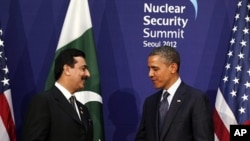Wednesday's meeting between U.S. and Pakistani military commanders, and discussions between President Barack Obama and Pakistani Prime Minister Yousaf Raza Gilani earlier this week are being described as productive first steps in re-establishing relations ruptured in November after a NATO airstrike killed 24 Pakistani soldiers. But Pakistan's parliament must make its final recommendations before formal negotiations between the two countries can begin.
The Obama-Gilani meeting at the nuclear security summit in Seoul earlier this week, during which he said the U.S. relationship with Pakistan must be based on mutual interest, trust and respect for Pakistani sovereignty, was welcomed as a conciliatory gesture.
Right tone
Pakistani Foreign Ministry spokesman Abdul Basit says these meetings set the right tone for the U.S. and Pakistan to renew relations soon and reopen NATO supply routes to Afghanistan.
“These reflect, very correctly, that Pakistan, U.S., they care about bilateral relations and we consider each other as important countries and would like to normalize our relations,” Basit said.
However, Basit says the prime minister and military leaders have pledged to abide by the recommendations of a parliamentary review of U.S.-Pakistan relations currently under way, and are reluctant to comment on the specifics until the process concludes.
Recommendations
The initial recommendations developed by the Pakistani parliament's committee on national security demanded an unconditional U.S. apology for a cross-border airstrike in November that killed 24 Pakistani soldiers and an end to American drone strikes inside the country as conditions for reopening NATO supply routes to Afghanistan
Washington has so far refused to apologize for the November airstrike, saying it was an unfortunate accident, and it views drone strikes as crucial to defeating al-Qaida and the Taliban. While Pakistan has publicly condemned drone attacks as a violation of the country's sovereignty, they are believed to be carried out with the help of Pakistani intelligence.
Prime Minister Gilani had asked for the parliamentary review to reach a political consensus prior to normalizing relations with the U.S.
Ahmed Bilal Mehboob, director of the Pakistan Institute of Legislative Development and Transparency, says Gilani's Pakistan Peoples Party, which holds a majority in parliament, will make sure the recommendations do not usurp the power of the executive branch.
“No executive would like to paint itself in a corner and cut off its options," noted Mehboob. "So I think the best thing would be for parliament, whatever resolution it passes, it should be broad enough to give leeway to the executive to fine tune the details."
This week, parliament delayed debate on U.S.-Pakistan relations to focus on an outbreak of political violence in Karachi.
News
High-Level Talks Help Ease US-Pakistan Tensions
- By Brian Padden





